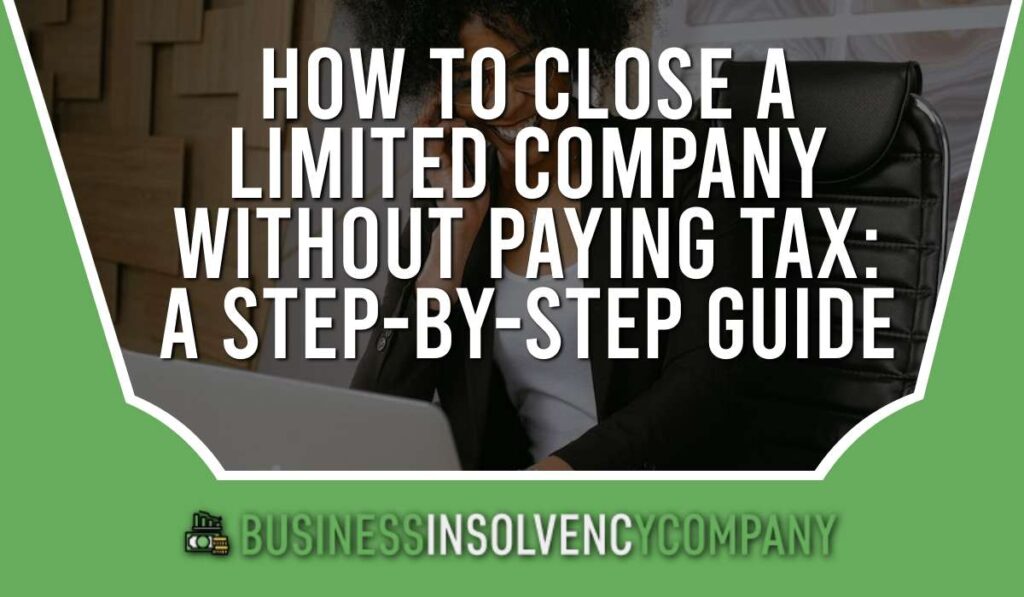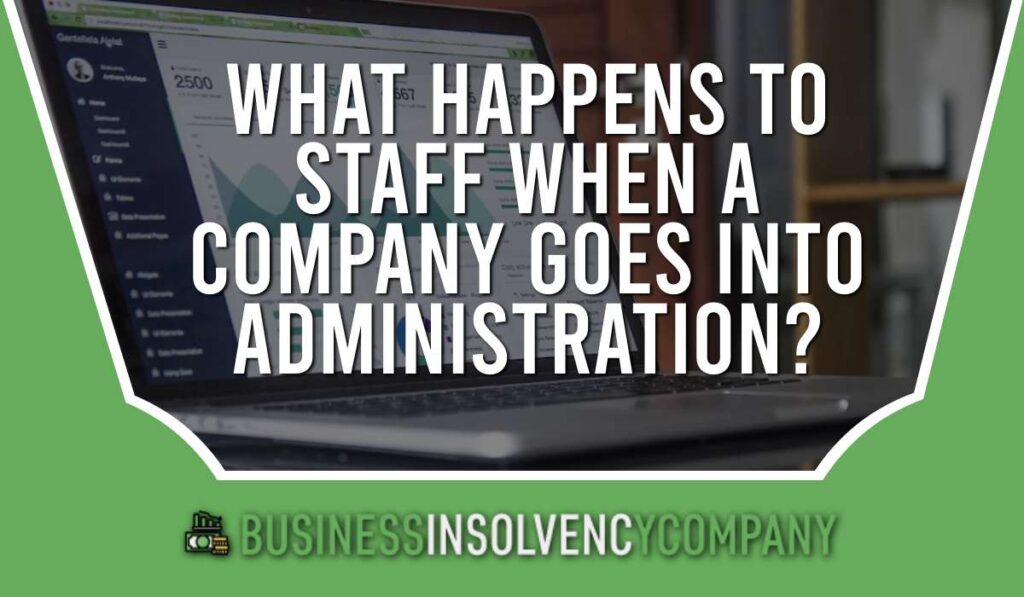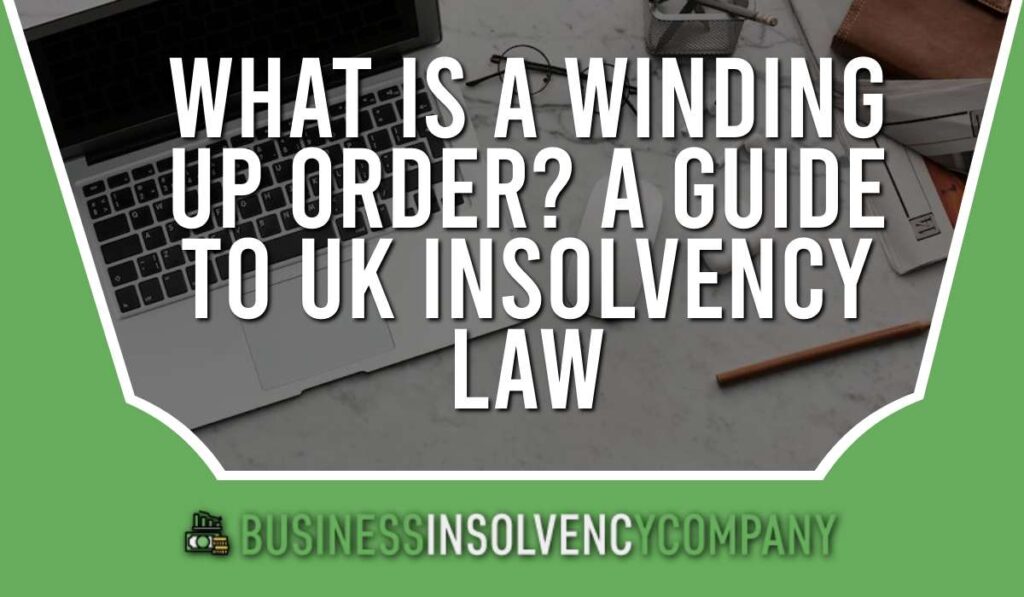20+ Years Experience
Specialist Business Insolvency Company

Get in Touch Today to Speak to a Specialist Adviser
The closure of a business is a difficult thing to cope with. With jobs lost, reputations at risk and livelihoods in the balance, it’s a stressful time for all involved. But when it comes to who pays redundancy when a business closes in the UK, things become far more complex.
In the United Kingdom, redundancy payments are typically the employer’s responsibility.
If the employer cannot meet their obligations or has ceased trading, then HM Revenue & Customs National Insurance Fund may assist with some or all of the payment.
The answer to who is responsible for providing redundancy payments can often depend on a range of factors, such as if the business was closed voluntarily or involuntarily or if the business was insolvent.
Local government can also provide assistance in some areas, although most of the time, the company owning the business is likely to be responsible for covering redundancy costs.
We would always recommend getting in contact with a licensed insolvency expert for free, confidential advice.
We will explore the intricacies of who pays redundancy when a business closes in the UK, identifying the different scenarios and responsibilities, including an introduction to the employee Insurance scheme that could provide financial security when a company announces bankruptcy.
Under UK employment law, employers must pay redundancy payments to employees if certain criteria are met. The first criterion is the employee must have been employed for two or more years for the employer to be legally obligated to pay redundancy payments.
The amount of these payments is based on the employee’s length of service, age, and pay rate before being made redundant. While these requirements are mandated by law, employers also have some leeway regarding making a redundancy payment when not required by law.
Companies may provide a redundancy payment to an employee who has not been employed for the minimum amount of time required by law; however, they are not obligated to do so.
If an employer fails to make a redundancy payment that they are obligated by law to make, then the affected employee may take legal action.
Employers must understand their obligations under UK employment law to avoid facing potential legal repercussions due to non-payment of redundancies.
Another factor that affects employer liability for redundancy payments is whether the company opted into a contractual obligation with former employees as part of their redundancy settlement agreement.
Employers may be held liable for any compensation associated with this arrangement in addition to any statutory payments due under UK employment law.
It is ultimately up to each employer as to whether they want to provide a one-off payment above and beyond statutory provisions when making staff redundant.
It is important that they fully understand their legal obligations so as not to risk any potential litigation.
UK Employment Law dictates a range of rights and obligations relating to redundancy when a business closes in the UK.
According to the government website, employees may be entitled to statutory redundancy pay if they meet specific conditions and criteria. This includes having at least two years’ continuous service with their employer, being between 18-23 years old, and notifying their employer that they have been made redundant.
Additionally, certain tax implications for redundancy pay outside of these statutory requirements should also be considered.
The debate here is who should be responsible for paying redundancy – employers or employees?
Employers may argue that they must pay redundancy to help cover closure costs and provide financial security for those affected. On the other hand, employees may argue that they should not bear any part of the cost, as often it is beyond their control whether or not a business closes down.
Ultimately, UK Employment Law outlines both parties’ obligations in such situations, which both employers and employees must consider.
It is important to understand your rights as well as your employer’s legal obligations regarding redundancy when a business closes in the UK. With this knowledge at hand, we can now move on to discuss redundancy entitlements in greater detail.
When a business closes, those employed by the business may be entitled to redundancy pay. Redundancy entitlements provide financial support to dislocated workers due to business closures. These entitlements depend on the worker’s age, length of continuous service and gross earnings.
Under UK law, all employees who are made redundant are entitled to statutory redundancy pay based on their salary and length of employment. It should also be noted that this entitlement does not apply to those resigning or retiring from their job.
The amount of the statutory redundancy payment is determined by the employee’s age, length of continuous service and gross weekly earnings: the older an employee and the longer they have worked for the company, the more redundancy pay they will receive.
For employees aged 41 or over, statutory redundancy pay can range anywhere from £5,856 to £16,140, depending on these factors.
Employers must be aware, however, that in addition to formal usual redundancy payments, other forms of compensation may be involved, such as holiday and notice pay due to the employee’s termination date.
There can also be scenarios in which trade unions representing the employees negotiate alternative settlements with employers, such as payments instead of notice, even if redundancies are not legally required.
This is done to guarantee proper terms and conditions for workers during redundancies.
It is important to note that despite any agreement between employer and employee, employees may not receive less than their minimum legal amounts as set out by law.
This ensures that staff members are protected against unfair treatment during what can normally be a difficult period in their lives.
Ultimately it is beneficial for both employers and employees to be aware of their rights when facing a business closure and its associated redundancies; employers need to understand the legal implications of making someone redundant, whilst employees need to understand their rights when it comes to calculations for payments such as statutory redundancy pay that they may be entitled to receive.
When a business closes, and workers are made redundant in the UK, the employer is legally required to pay any wages that are owed, as well as any redundancy payments.
Depending on an individual’s employment status and company size, they may also be entitled to other types of compensation, such as notice pay, holiday pay, or statutory redundancy payments.
Not all employees will be eligible for a redundancy payment; this depends on how many people work at the company and how long they have been employed there. Employees who have worked at the company for more than two years are typically eligible to receive statutory redundancy payments.
Employees employed for shorter periods may not be legally entitled to anything other than the wages owed. In some cases, employers may offer voluntary redundancy payments to departing employees; however, these payments are not required by law.
For those who qualify for redundancy payments, the exact amount will vary depending on an individual’s length of service, age and weekly earnings. Generally speaking, the longer someone has been employed with a company, the higher their entitlement will be.
Statutory redundancy payments only cover a certain period – usually up to eight weeks – so employees must make sure they can find another job quickly or consider claiming some other kind of benefit such as Jobseeker’s Allowance.
In summary, when a business closes and workers are made redundant in the UK, eligible employees have legal rights to certain payments, such as wages owed and potentially additional compensation if they have met certain criteria determined by the government.
The debate over entitlements varies depending upon which side one is looking at; employers tend to disagree about which kinds of compensation should be mandatory for redundant employees, while dependent employees feel that these criteria should be much stricter to provide adequate protection during layoffs.
To get a better picture of what one is entitled to claim after redundancy, it helps to move on to understanding what steps must be taken to make such claims – this is covered in the next section “Claiming Redundancy”.
When a business closes in the UK, employees who have worked for two or more years may be entitled to redundancy pay.
Whether an employee is eligible for redundancy or pay depends on their employment contract and the terms of their notice period.
Employers must also demonstrate that the redundancies are fair and have taken steps to avoid them wherever possible.
Employees are entitled to a minimum of one week’s pay for each year of service with the company up until the age of 22, then one and a half weeks up until the age of 41 and two weeks thereafter.
This will range from £5,853 (gross) per year in England, Wales and Scotland and is lower in Northern Ireland.
In addition to statutory redundancy pay, some employers may offer enhanced redundancy payments or additional benefits such as paid time off or additional pension contributions.
Such circumstances can be difficult and highly emotive for both employees and employers alike, and employers must take care when making redundancies to ensure that any decisions taken are fair and do not discriminate against certain employees due to factors such as ethnicity, disability or gender.
Furthermore, employees need to check the terms of their contracts regarding the calculation of redundancy pay so that they know how much they may expect upon the termination of their employment with the organization.
Claiming redundancy can be a complex process involving several different types of payments depending on an individual’s employment contract, length of service and seniority within an organization.
To ensure that all employees receive what they are entitled to upon closure of a business, employers must provide clear information regarding what they are liable for and how this affects the amount individuals may receive on redundancy.
When a business in the UK closes, employees who have been working for two or more years may be eligible for redundancy pay.
Eligibility is based on their employment contract and the terms of their notice period. The minimum amount of redundancy pay employees may receive determined by their age and length of service (1-2 weeks per year), with a maximum amount of £5,853 (gross) per year in England, Wales and Scotland.
Depending on the circumstances, additional payments and benefits may also be offered by the employer. Employers must ensure these decisions are fair, while employees should check their contracts regarding the calculation of redundancy pay to understand how much they may expect upon termination.
Ultimately, employers must provide clear information regarding what they are liable for so that employees receive what they are entitled to upon closing a business.
When a business closes and can no longer employ its workers, redundancy payments may be necessary.
This can be a difficult prospect for employers, as they have obligations to their former employees and must prepare for the financial costs associated with redundancies.
Depending on the size of the business, the legal framework governing employment within the United Kingdom, and other factors, various parties may be liable for paying redundancies.
In most cases, the employer is expected to shoulder these expenses and make redundancy payments as per contractual terms or mandated by law.
The employer may also opt to use their resources, such as wages or sick leave, to compensate employees who are laid off due to business closure.
However, where larger companies are involved, bankruptcy proceedings may come into effect, which could absolve the employer of some or all redundancy payment responsibilities.
Commercial creditors may be responsible for making payments, potentially through an insolvency practitioner appointed by the court. If any payments remain outstanding after completing these processes, HMRC (Her Majesty’s Revenue and Customs) may step in and pay some or all of them through its Redundancy Payments Office.
This arrangement should not affect any liability that employers have under employment laws.
These various scenarios demonstrate how redundancy payments may be made when businesses close down in the UK.
Ultimately, it is important for employers– regardless of size or scope– to understand their legal obligations towards their employees and plan accordingly for situations such as business closure or restructuring that might require redundancy payments.
Government agencies can advise and guide people who have been made redundant.
They work with employers to ensure that employees’ rights are respected and offer support and information on available resources. Depending on the circumstances, they can also review decisions employers make about redundancy packages or challenge unfair dismissals.
Sometimes, an employer may be required to pay redundancy payments when their business closes in the UK.
The qualifying conditions for such payments usually revolve around continuous years of service and age of the employee. Generally, an employee must be above certain age (usually 22) and work for the same firm for at least two full years to qualify for a mandatory redundancy payment.
However, it is important to note that not all workers are eligible for these payments – self-employed individuals and independent contractors, for example, do not qualify.
Not all employers are legally obliged to pay redundancy when they stop operating in the UK;. In contrast, minimum statutory redundancy pay exists under UK labour law; voluntary arrangements may differ according to specific company policies.
The government bodies can provide advice based on the individual’s circumstances, and employers can refer to the right authorities when considering their options for distributing funds following the closure of their business.
Debates may arise regarding how much employees should receive in compensation for lost wages due to job loss caused by the business closing down.
While some protections are provided by law, such as protections against unfair dismissal or unlawful discrimination, it is ultimately up to the employer to decide whether they will provide any additional redundancy pay above statutory requirements.
People should seek help from government agencies to understand their rights and obligations when facing job losses due to a business closing in the UK.
Knowing the details of a particular case helps ensure that employees obtain all they are entitled to under current labour laws.
The next section will discuss what individuals should consider before claiming redundancy so that they can fully understand their rights and responsibilities in such a difficult situation.
When facing redundancy, most workers in the UK have a right to claim redundancy pay.
Before making a claim for redundancy, it is important to consider a few key points, such as whether or not the company is liable to make redundancy payments and which type of package might be most suitable.
Firstly, to be eligible to receive statutory redundancy pay, the employee must generally have worked with the employer for two years or more unless they are dismissed due to other agreed-upon terms and conditions such as ill health or severe disability. Additionally, the business must have employed at least 15 people regularly.
This means that if someone has worked for a company for less than two years or if the company employs 14 or fewer people regularly, then they may not qualify for statutory redundancy pay.
In some cases, an employer may also pay their redundant employees an enhanced redundancy package as part of their severance package.
This could include greater compensation than the statutory amount or bonuses depending on each individual’s situation. It is important to evaluate this option carefully and speak with an advisor who can explain the options available before making any snap decisions.
Employees should note that enhanced packages are not always offered and usually do not apply when redundancies occur due to large-scale restructuring operations.
On top of asking for what’s entitled through laws and contracts relating to redundancy, it is also worthwhile considering other direct costs associated with being made redundant such as lost income or pension contributions over time when renegotiating any final packages.
Workers should always seek professional advice if they need help understanding their legal rights and entitlements before deciding what type of package might be best for them.
Given that many factors need to be considered when dealing with claims of redundancy pay, it is important to consider these various components before taking further action or signing any documents related to a redundancy settlement.
In considering the issue of who pays redundancy when a business closes in the UK, there are several other considerations to consider. These include taxation and obligations for contributions for prior employees.
When it comes to taxation, companies must pay due consideration to the existing tax regime and any changes that may arise from the closure of a business.
Specifically, companies must ensure that all outstanding tax debts are paid before redundancy payments can be made.
Businesses must seek advice from their accountants to ensure a smooth transition.
Another consideration when closing a business is any liability the company has for contributions to prior employees, such as pension contributions or national insurance payments.
If contributions were not made at the appropriate time and by legal requirements, then these may need to be addressed to be compliant and prevent financial penalties.
Employees’ rights should also be considered when closing a business.
The Employment Rights Act 1996 guarantees everyone certain rights upon leaving employment, and if these have not been upheld, then claims could potentially be brought against the company.
Such claims could include unfair dismissal or discrimination, requiring the payment of significant sums by way of compensation.
When closing a business in the UK, there are several facets to consider in addition to who pays redundancy.
Companies must ensure they comply with tax and legal requirements, illustrate fairness towards departing staff members and uphold their moral duty as responsible employers when dealing with matters surrounding employee redundancies.
The responsibility for paying redundancy payments when a business closes in the UK lies with the employer.
The Employment Rights Act 1996 stipulates that an employee who has been made redundant is entitled to a statutory redundancy payment, which is calculated by multiplying their weekly pay with their years of continuous service capped at 20 years.
However, if the business has insufficient funds, it is ultimately the government’s responsibility to provide redundancy payments through the Redundancy Payments Service.
This is paid case-by-case basis, taking into account the employee’s length of service, age, and salary.
In such situations, employers should contact their local Jobcentre Plus as soon as possible to discuss eligibility and make any necessary arrangements.
In the United Kingdom, to be eligible for redundancy pay, an employee must:
Additionally, employees may be entitled to a statutory redundancy payment if they have been working for their employer for at least two years and have been dismissed due to redundancy. This payment is calculated based on the employee’s age and length of service and can amount to up to a maximum cap (currently £16,140) based on these factors.
Some employers may also offer additional redundancy payments over and above this amount.
The UK Government has created detailed regulations around redundancy payments, including how much should be paid out, when it should be paid and which employees are eligible. T
hese regulations help protect workers that find themselves in this difficult situation and ensure they receive some financial security during this uncertain time.
An employee in the UK is entitled to at least statutory redundancy pay if their employer has closed.
The amount will depend on a few factors, including their length of continuous employment and age. Under the law, employees with two or more years of continuous service are entitled to:
Employees with less than two years of continuous service will not be eligible for statutory redundancy pay, although they may still get some other benefits through Employment Support Allowance.
In addition to statutory redundancy payments, some employers provide a more generous enhanced redundancy package which can include additional benefits such as up to six months’ salary or pension contributions.
It’s important to note that any redundancy payment is subject to a maximum of 20 years of service and a weekly wage cap of £525 – meaning that the most an employee can receive as redundancy pay is £16,500. It’s also worth noting that certain workers, including share fishermen and directors, do not qualify for statutory redundancy payments.
In the UK, employers must pay redundancy compensation to employees who have been employed for two years or more.
Redundancy payments under UK law vary depending on the length of service and age of the employee but generally range between one week’s and four weeks’ pay per year of service.
According to research conducted by the Department for Business, Energy & Industrial Strategy (BEIS) in 2018, around 593,000 employees received redundancy payments that year alone.
Here are some other informative articles about business debt in the UK:






































We Aim To Reply To All Enquiries With-in 24-Hours